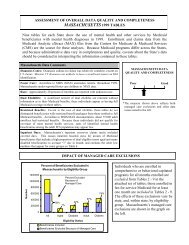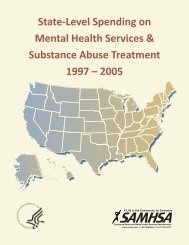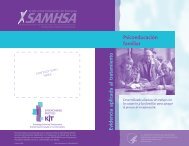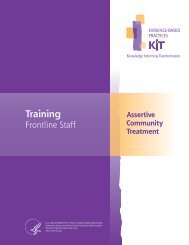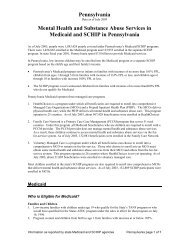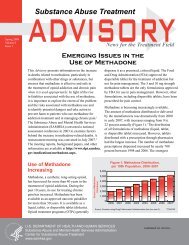Evaluation Findings - SAMHSA Store - Substance Abuse and Mental ...
Evaluation Findings - SAMHSA Store - Substance Abuse and Mental ...
Evaluation Findings - SAMHSA Store - Substance Abuse and Mental ...
Create successful ePaper yourself
Turn your PDF publications into a flip-book with our unique Google optimized e-Paper software.
To What Extent Do Systems of<br />
Care Implement Strategies to<br />
Sustain Their Services Beyond<br />
the Federally Funded Grant<br />
Period<br />
The intent of the CMHI is that the systems<br />
of care receiving Federal funds will be<br />
maintained <strong>and</strong> will continue to provide<br />
services beyond the grant-funded period.<br />
Systems of care have used a variety of<br />
strategies to sustain their systems of care<br />
over time, including a range of general<br />
strategies <strong>and</strong> a range of financing strategies<br />
as shown in Table 7. The use of these<br />
strategies is assessed during the sixth year of<br />
the Federal funding cycle. Five years after<br />
Federal program funding ends, the<br />
communities included in this report will be<br />
assessed to determine the extent to which<br />
the key components of their systems of care<br />
have been maintained, as well as the<br />
perceived effectiveness of the strategies that<br />
they have employed for sustaining their<br />
systems of care over time.<br />
Communities Implemented Strategies<br />
for the Long-Term Maintenance of<br />
their Systems of Care<br />
Systems of care used a wide variety of<br />
approaches <strong>and</strong> financing strategies to<br />
sustain their infrastructure <strong>and</strong> services<br />
<strong>and</strong> supports beyond the grant-funded<br />
period.<br />
Sustainability Strategies<br />
General Strategies<br />
1) Established an Ongoing Locus of Accountability<br />
Created viable, ongoing focal points for system of care management at the local level (e.g.,<br />
agency, office, staff) to support <strong>and</strong> manage sustaining systems of care<br />
Created a viable, ongoing focal point for system of care management at the State level (e.g.,<br />
agency, office, staff) to support <strong>and</strong> manage sustaining <strong>and</strong> statewide development of systems of<br />
care<br />
2) Established a Strong Family Organization <strong>and</strong> Advocacy Base<br />
Established a strong family organization to advocate, support, <strong>and</strong> be involved in sustaining<br />
systems of care (e.g., through funding, involvement at the system <strong>and</strong> policy levels, contracting<br />
for training <strong>and</strong> specific services, etc.)<br />
Cultivated partnerships with key stakeholders using social marketing <strong>and</strong> other approaches to<br />
create support for sustaining systems of care (e.g., families, youth, providers, managed care<br />
organization leaders, State <strong>and</strong> community leaders, etc.)<br />
Created an effective advocacy base among key constituencies <strong>and</strong> audiences to advocate<br />
sustaining systems of care through social marketing approaches<br />
Identified key audiences <strong>and</strong> developed ―messages‖ for these audiences on the need <strong>and</strong><br />
urgency of focusing on children‘s mental health to generate underst<strong>and</strong>ing <strong>and</strong> support for<br />
sustaining systems of care<br />
The Comprehensive Community <strong>Mental</strong> Health Services for Children <strong>and</strong> Their Families Program <strong>Evaluation</strong> <strong>Findings</strong><br />
2006–2008 Annual Report to Congress ● Page 33



